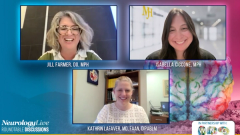
10 Years of the Women Neurologists Group: A Preview of the 4th Annual Conference

Movement disorder specialists reflected on the community’s growth over the past decade in the Women Neurologists Group and shared program highlights of the group’s upcoming conference. [WATCH TIME: 5 minutes]
WATCH TIME: 5 minutes | Captions are auto-generated and may contain errors.
The
In collaboration with the WNG, NeurologyLive® held a roundtable discussion with 2 of the conference’s program cochairs,
In this first episode, Farmer and LaFaver discussed the origins and growth of the WNG, a private online community created to support women neurologists from residency through retirement. They explained how the WNG can offer a trusted space for professional guidance, career transitions, mentorship, and personal support. Both Farmer and LaFaver emphasized WNG’s role as a valuable resource for networking and problem-solving and shared their excitement about reconnecting in person with colleagues at the annual conference.
Transcript edited for clarity.
Isabella Ciccone, MPH: I'm Isabella Ciccone, associate editor for NeurologyLive, an online news resource for neurologists. Today, I am here with 2 women experts in neurology to talk a bit about their upcoming annual meeting, which is already in its 4th year.
Jill M. Farmer, DO, MPH: Hi everyone. My name is Jill Farmer. I am a movement disorder specialist in the Princeton area of New Jersey, and I have been a part of the WNG on Facebook since almost the beginning—not quite 10 years, which is as old as the group is—but a little bit after that. I was integral in helping with the very first conference we had.
Kathrin LaFaver, MD, FAAN, DipABLM: Hi. My name is Kathrin LaFaver. I am also a movement disorder specialist. I've practiced in different areas around the country, but am currently in Saratoga Springs in upstate New York. Besides being interested in movement disorders, WNG has really been a big part of my life over the past 10 years. It's been a great resource for all kinds of professionalism questions and career changes that I've dealt with, and I was able to get a lot of support from the group.
We started the group 10 years ago, as Farmer was mentioning, to connect women neurologists better and help us all with questions we’re dealing with, both professionally and in our personal lives. It’s been a great resource, and we’re very much looking forward to connecting again in person in Colorado Springs in October.
Jill M. Farmer, DO, MPH: I like to say that our group is for women neurologists from residency through retirement, so we have a nice, wide range.
Isabella Ciccone, MPH: Great. Thank you both for joining me today to talk more about the meeting for those who may be interested in attending. Could you give us a brief overview of the WNG in general?
Jill M. Farmer, DO, MPH: It started as an offshoot of an even larger social media group on Facebook called Physician Moms. That became a juggernaut and grew to over 80,000 members. And when a group gets that large, it naturally fragments into smaller components. In medicine, it makes sense to do that by specialty or subspecialty. So the WNG was formed. We were not the original people that brought it over as an offshoot, but fairly quickly, LaFaver got involved and helped it grow into this really wonderful online community.
It’s private; you have to be invited to join. It is a space for all ages and stages of people in their neurology journey, from those in training to those with a wealth of career advice and experience who are now into retirement and looking to be mentors and help people as they advance in their careers. The entire community has been a place where people can really thrive.
They can ask questions about neurological diagnoses and patients, but even more so, it’s a place where they can ask questions about what it’s like to balance work and life. How do you advance in your career if you’re looking to shift from academics to private practice, or from private practice to academics? Or if you want to start your own practice and maybe not accept insurance?
All the various things, questions, and hurdles that make people nervous—they have the opportunity to share, ask questions, and just put it out there for the community to respond. We’re pretty lucky that now, with around 4,000 if not more members, we have a really nice, collegial group. There’s very little drama, which we all appreciate.
Newsletter
Keep your finger on the pulse of neurology—subscribe to NeurologyLive for expert interviews, new data, and breakthrough treatment updates.











